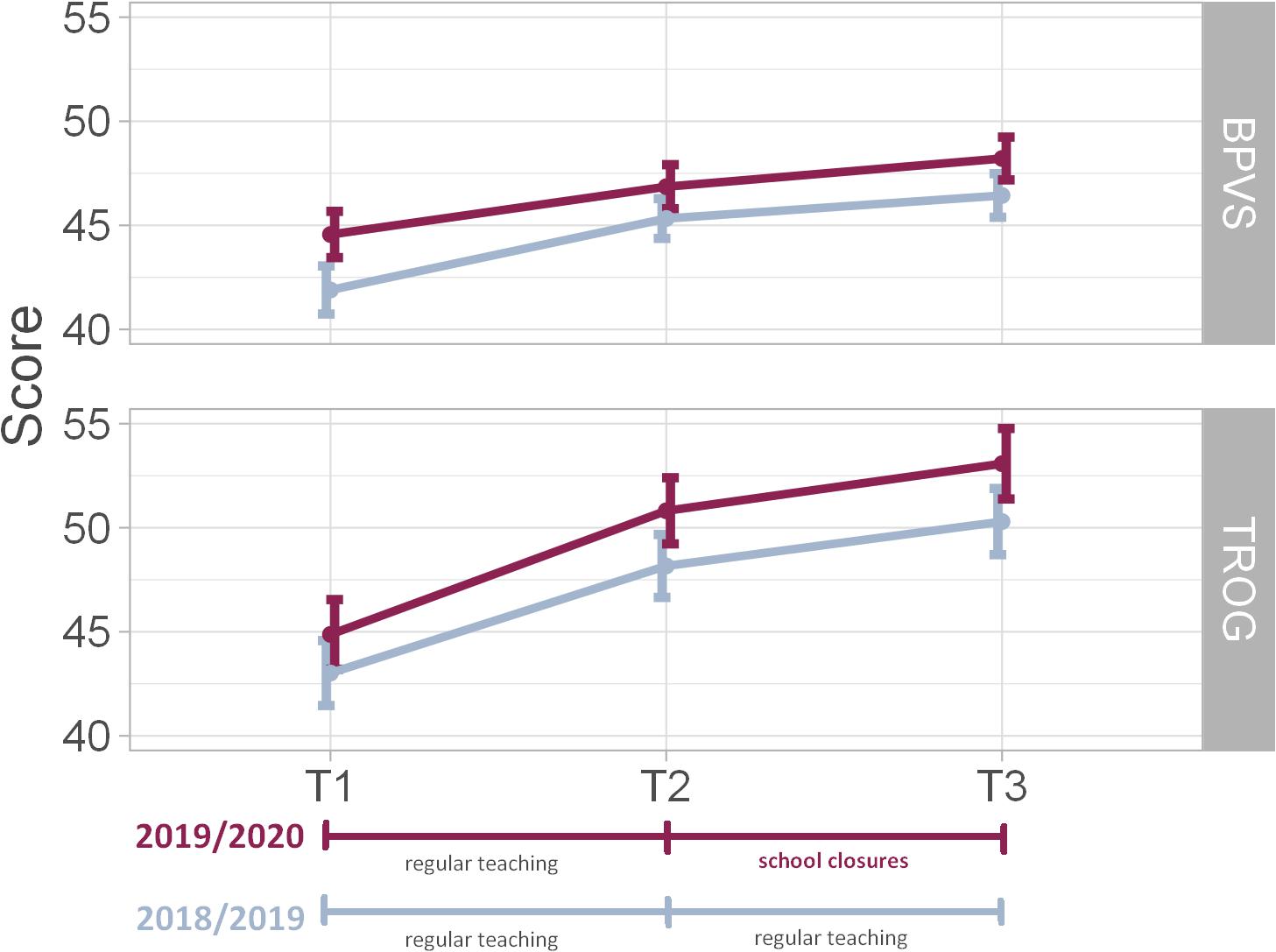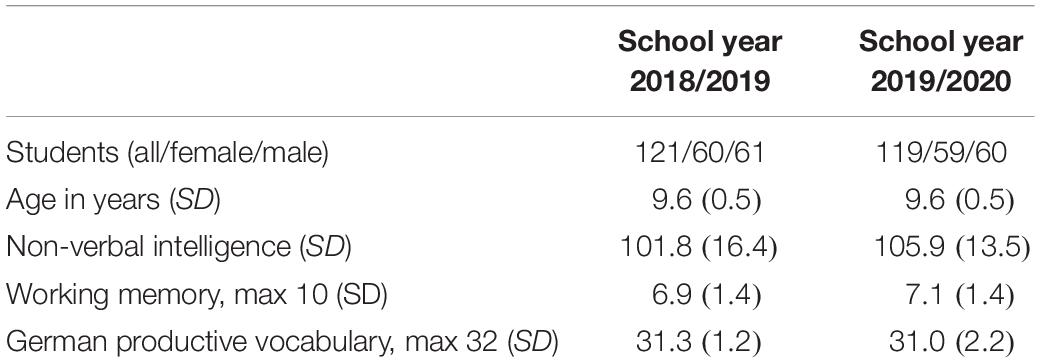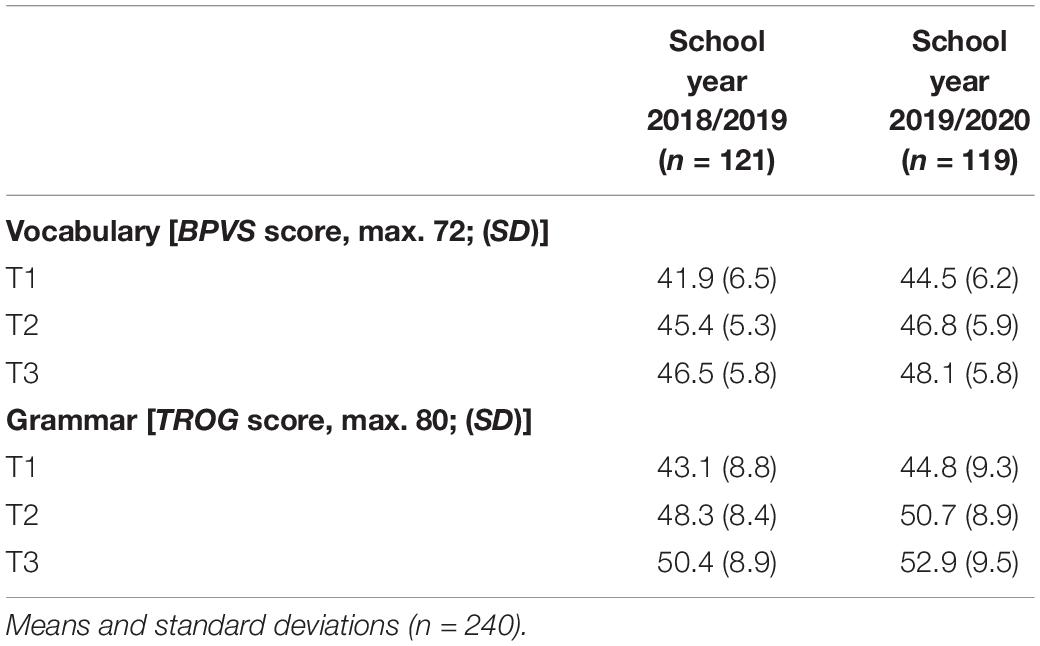- 1English and American Studies, University of Braunschweig, Braunschweig, Germany
- 2Department of English Linguistics, University of Mannheim, Mannheim, Germany
This report assesses effects of temporary school closures during the 2020 Covid-19 pandemic in Germany on early foreign language development among primary-school learners of English. We analyze English vocabulary and grammar skills before and after 15 weeks of school closures and the subsequent suspension of foreign-language (FL) instruction. In addition, we compare data from 141 students who experienced interruptions in schooling in 2020 to a matched group of 128 students who had received continuous instruction in the previous school year. The study did not find any negative effects of the temporary instructional suspension on FL vocabulary or grammar. Moreover, variance between students did not increase, and the effect structure of cognitive predictors of FL skills remained the same. Overall, temporary suspensions of FL instruction of the nature and length experienced during the 2020 Covid-19 pandemic did not appear to have detrimental effects on general foreign language learning among young students.
Introduction
In the ongoing Covid-19 pandemic, policy decisions to close schools have been under debate. As decision makers need to balance public health and educational concerns, there is little evidence available how interruptions in instruction due to school closures affect students’ academic achievement and language development.
This study assesses the impact of school closures on foreign-language (FL) development in the context of early English instruction in German primary schools. Studying the impact of instructional disruptions on early FL learning is particularly suitable, since English as a foreign language (EFL) instruction was not systematically compensated for during school closures, and primary school students have little exposure to English outside school in German society.
As in many European countries, primary schools in Germany had been closed for 7 weeks in the spring of 2020, and in subsequent weeks, there were no regular FL classes as instruction in smaller classes was required to focus on core subjects, such as German and mathematics. As a consequence, even when the schools reopened, EFL lessons either did not take place at all or were scaled back dramatically. Using standardized language tasks, we measured FL skills immediately prior to school closures and after schools gradually reopened. The present study assesses the effects of the suspension of regular EFL instruction for 15 weeks among 4th-grade primary school students compared to students at the same schools a year earlier who continued to have English lessons between the assessments. We focus on EFL development in general vocabulary and grammar.
Materials and Methods
The data were collected as part of the MEG-SKoRe project (Hopp et al., 2020), which partially coincided with the 2020 Covid-19 pandemic. In the project, we tracked the language development of 269 fourth-grade students in two intact classes each in four primary schools in the German state of Lower Saxony. In the school year 2018/2019 with regular teaching, data from 128 students was collected, and in the school year 2019/2020 with Covid-19 related school closures, data from 141 students was available.
Starting from Grade 3, primary-school students in Lower Saxony have two 45-min lessons of English per week that mostly focused on developing basic listening and speaking skills through communicative activities and tasks. As part of the MEG-SKoRe project, the same teachers taught the classes using the same materials and activities for 6 months, so that the input was highly comparable between the school years 2018/2019 and 2019/2020.
Of the 269 students who took part in the study in fourth grade, we excluded 24 students from analysis because data were not available at all tests and five students because they had English as one of their home languages. For the remaining 240 students, Table 1 gives an overview for both school years. In addition to biographical information, we assessed non-verbal intelligence using part 1 of the non-verbal culture-fair intelligence test “Grundintelligenztest Skala 2 – Revision” (CFT 20-R; Weiß, 2006), working memory with a forward digit span task (adapted from HAWIK-IV; Petermann and Petermann, 2008), and proficiency in the majority language of the environment, German, via a test on productive vocabulary (Cross-Linguistic Lexical Test; Haman et al., 2017).
The students across school years were matched on all background measures, as demonstrated by a series of one-way ANOVAs with the between-subject factor Group (all ps > 0.19), except for non-verbal IQ, where participants in school year 2019/2020 had statistically higher scores [F(1,238) = 4.537; p = 0.034].
To assess EFL development, the study used the British Picture and Vocabulary Scale (BPVS3; Dunn et al., 2009) to assess receptive vocabulary skills and the Test for Reception of Grammar (TROG-2; Bishop, 2003) for grammar.
All students completed these tasks following the autumn break in the academic year (T1; September 2018 and 2019), in the weeks before Easter the following year (T2; March), and shortly before the end of the academic year (T3; June and July). Schooling was interrupted between T2 and T3 in the school year 2019/2020, while regular instruction continued in the school year 2018/2019. The mean time period between T1 and T2 was 180 days (SD = 7.3), 185 days (SD = 6.8) in the school year 2018/2019, and 175 days (SD = 3.7) in the school year 2019/2020. The mean time period between T2 and T3 was 97 days (SD = 12.6), with a shorter period in the school year 2018/2019 (M = 85 days; SD = 8.0) than in the school year 2019/2020 (M = 107 days; SD = 4.2). The differences between groups for the time period T2–T3 was highly significant [F(1,238) = 670.4; p < 0.001], underlining that the school closures between T2 and T3 in 2020 led to a longer interval in the school year 2019/2020.
Results
The mean test scores for each group are given in Table 2. Figure 1 plots the development of English vocabulary skills (BPVS, upper panel) and grammar skills (TROG, lower panel).

Figure 1. English vocabulary scores (BPVS) and grammar scores (TROG) by Testing Session and Group. Error bars denote 95% confidence intervals (n = 240).
As seen in Figure 1, the students in the year 2019/2020 scored slightly better than the group from 2018/2019 throughout. Both groups demonstrated comparable development from T1 to T2, and – crucially – also from T2 to T3, despite differences in the availability of instruction. For vocabulary, a one-way ANOVA with Group and Testing Session as factors returned main effects of Testing Session [F(1,238) = 82.32; p < 0.001; η2 = 0.076] and Group [F(1,238) = 7.589; p = 0.006; η2 = 0.022] with weak effects sizes, yet no interaction of the two [F(1,238) = 1.989; p = 0.138; η2 = 0.002]. For grammar, a separate ANOVA equally yielded main effects of Testing Session [F(1,238) = 232.24; p < 0.001; η2 = 0.116] and Group [F(1,238) = 4.152; p = 0.043; η2 = 0.013], yet no interaction of the two [F(1,238) = 0.485; p = 0.485; η2< 0.001].
In a post-hoc analysis specifically targeting development from T2 to T3, there were no differences between the groups for either vocabulary or grammar. A repeated measures ANOVA with Testing Session as within-subject factor and Group as between-subjects factor returned main effects of Testing Session [T2 vs. T3; BPVS: F(1,238) = 16.016; p < 0.001; η2 = 0.011; TROG: F(1,238) = 44.221; p < 0.001; η2 = 0.015] and Group [BPVS: F(1,238) = 4.753; p = 0.030; η2 = 0.016; TROG: F(1,238) = 4.894; p = 0.028; η2 = 0.018], yet no interactions with Group [BPVS: F(1,238) = 0.159; p = 0.690; η2< 0.001; TROG: F(1,238) = 0.073; p = 0.788; η2 < 0.001]. In other words, both groups continued to improve their English, even though the students in the school year 2019/2020 did not receive regular English lessons in school for 15 weeks.
In a further analysis, we probed whether less proficient students in the school year 2019/20 were particularly disadvantaged by the suspension of instruction. To this end, we assessed whether development from T2 to T3 depended on the students’ proficiency level. For the school year 2019/2020, there was a moderate but highly significant negative correlation between the vocabulary scores at T2 and the gains from T2 to T3 [BPVS: r(119) = −0.345, p < 0.001], yet no effect for grammar [TROG: r(119) = −0.158, p = 0.087]. For the preceding year, the group showed similar contingencies [BPVS: r(121) = −0.387, p < 0.001; TROG: r(121) = −0.212, p = 0.011]. These findings bear out that, in both school years, weaker students showed larger learning gains from T2 to T3 than more advanced students, who had had higher scores at T2 already, suggesting that instructional disruption did not disproportionally impact weaker students.
Finally, we explored which individual differences contributed to vocabulary and grammar development, using regression analyses with the following predictors: non-verbal IQ, working memory, phonological awareness, German vocabulary, gender, and whether speakers were monolingual German speakers or spoke languages other than German at home (for details on predictors, see Hopp et al., 2019). For the school year 2019/2020, there was no change in the structure of predictors from T2 to T3. For vocabulary, significant predictors were non-verbal IQ and phonological awareness, and variance in grammar scores was due to non-verbal IQ, phonological awareness and working memory. Other factors were non-significant. These results indicate that the underlying cognitive contributors of early FL development did not change due to the temporary suspension of instruction.
Discussion
This study assessed the effects of the suspension of teaching due to school closures as part of the Covid-19 pandemic in the school year 2019/2020 among primary school students learning English as a foreign language. Compared to matched groups of students who had been taught by the same teachers using the same methods and materials the year before, students in fourth grade during the spring 2020 school shutdowns did not show any differences in FL development, and they retained and even marginally improved their EFL skills when no or very little EFL instruction was available for 15 weeks.
Our data suggest that temporary suspensions of FL teaching do not necssarily have detrimental effects on students’ general FL development, even though no or only little compensatory FL instruction took place during the school shutdowns. There were no differences between vocabulary and grammatical development, although vocabulary has been shown to be more prone to stagnation and regression than grammar when input is suspended for longer periods (Larson-Hall, 2019).
The duration of the school closures and the subsequent suspension of FL instruction were considerably longer than typical school holidays, yet we observed no negative effects on development. In spite of its limited scope, our study thus suggests that early FL development is robust against temporary suspensions of input and instruction, even among young learners at low proficiency, whose emerging FL knowledge may be particularly susceptible to erosion. It is unlikely that the group in the school year 2019/2020 continued to improve in English from T2 to T3 because they had systematic exposure to English outside school. At an individual level, students may well have received more or less parental or other non-institutional tuition in English during school closures. The study could not collect such data, since questions about these topics had not been part of the preregistered protocol. However, the fact that the variance of scores did not increase for T3 in the school year 2019/2020 (Table 2) may be interpreted to indicate that the time of school closure did not implicate greater inter-individual differences in FL development. Instead, FL development appears to have continued to unfold for some time even in the absence of sustained input and instruction.
We stress that this paper does not represent a controlled study that was designed to explore FL development when no FL input is available; rather, it charts early FL development in a real-life pandemic situation when FL instruction and input temporarily ceases, drastically reduces and becomes more varied. It is clear from other research that complete and long-term reductions in input lead to arrested development and regression in the first language (e.g., Montrul, 2016) and foreign languages (e.g., Mehotcheva and Köpke, 2019), yet short-term interruptions of the nature experienced in the spring of 2020 did not have measurable effects on general FL skills.
Our conclusions are restricted to foreign-language development, and development in other school subjects and areas may be different. Further, our study does not speak to other aspects of education, such as social and emotional factors, all of which need to be considered in the context of school closures. By furnishing evidence on effects of short-term school closures in one domain, the present study can nevertheless inform the discussion about balancing educational and public health concerns.
Data Availability Statement
The raw data supporting the conclusions of this article will be made available by the authors, without undue reservation.
Ethics Statement
Ethical review and approval was not required for the study on human participants in accordance with the local legislation and institutional requirements. Written informed consent to participate in this study was provided by the participants’ legal guardian/next of kin.
Author Contributions
HH and DT were PIs on the project and wrote the manuscript. HH analyzed the data. All authors contributed to the article and approved the submitted version.
Funding
The project MEG-SKoRe (“Sprachliche und kognitive Ressourcen der Mehrsprachigkeit im Englischerwerb in der Grundschule”) was funded by the German Federal Ministry of Education and Research (BMBF) as part of the research initiative “Sprachliche Bildung und Mehrsprachigkeit” (FKZ 01JM1702A/B, 2017–2020).
Conflict of Interest
The authors declare that the research was conducted in the absence of any commercial or financial relationships that could be construed as a potential conflict of interest.
References
Bishop, D. V. M. (2003). Test for Reception of Grammar: TROG-2: Manual (version 2). London: Pearson.
Dunn, L. M., Dunn, D. M., Styles, B., and Sewell, J. (2009). British Picture Vocabulary Scale. BPVS-III. Lloyd. London: GL Assessment.
Haman, E., Łuniewsk, M., Hansen, P., Simonsen, H. G., Chiat, S., Bjekić, J., et al. (2017). Noun and verb knowledge in monolingual preschool children across 17 languages: Data from Cross-linguistic Lexical Tasks (LITMUS-CLT). Clin. Linguist. Phon. 31, 818–843, doi: 10.1080/02699206.2017.1308553
Hopp, H., Jakisch, J., Sturm, S., Becker, C., and Thoma, D. (2020). Integrating multilingualism into the early foreign language classroom: empirical and teaching perspectives. Int. Multilingual Res. J. 14, 146–162.
Hopp, H., Vogelbacher, M., Kieseier, T., and Thoma, D. (2019). Bilingual advantages in early foreign language learning: effects of the minority and the majority language. Learn. Instruct. 61, 99–110. doi: 10.1016/j.learninstruc.2019.02.001
Larson-Hall, J. (2019). “L2 Lexical Attrition,” in The Oxford Handbook of Language Attrition, eds M. S. Schmid and B. Köpcke (Oxford: Oxford University Press), 376–390. doi: 10.1093/oxfordhb/9780198793595.013.30
Mehotcheva, T. H., and Köpke, B. (2019). “Introduction to L2 attrition,” in The Oxford Handbook of Language Attrition, eds M. S. Schmid and B. Köpcke (Oxford: Oxford University Press), 329–348. doi: 10.1093/oxfordhb/9780198793595.013.27
Petermann, F., and Petermann, U. (2008). HAWIK-IV. Kindheit Entwicklung 17, 71–75. doi: 10.1026/0942-5403.17.2.71
Keywords: foreign language, English – second language, primary school, school closures, Covid-19
Citation: Hopp H and Thoma D (2020) Foreign Language Development During Temporary School Closures in the 2020 Covid-19 Pandemic. Front. Educ. 5:601017. doi: 10.3389/feduc.2020.601017
Received: 31 August 2020; Accepted: 19 October 2020;
Published: 11 November 2020.
Edited by:
Marco A. Bravo, Santa Clara University, United StatesReviewed by:
Kristine Sudbeck, Nebraska Indian Community College (NICC), United StatesJenelle Reeves, University of Nebraska–Lincoln, United States
Copyright © 2020 Hopp and Thoma. This is an open-access article distributed under the terms of the Creative Commons Attribution License (CC BY). The use, distribution or reproduction in other forums is permitted, provided the original author(s) and the copyright owner(s) are credited and that the original publication in this journal is cited, in accordance with accepted academic practice. No use, distribution or reproduction is permitted which does not comply with these terms.
*Correspondence: Holger Hopp, aC5ob3BwQHR1LWJyYXVuc2Nod2VpZy5kZQ==
 Holger Hopp
Holger Hopp Dieter Thoma
Dieter Thoma
